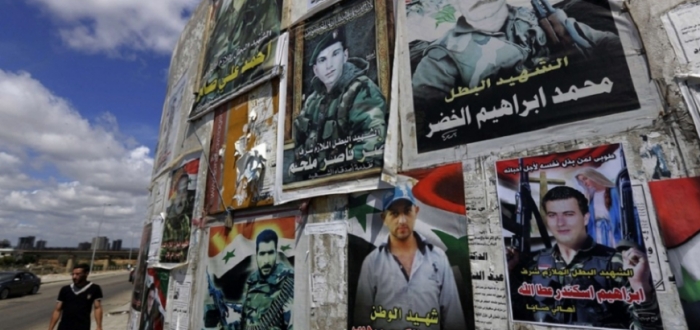Loyalist cities along the Syrian coast continue to foot the bill for the confrontation that the Assad forces have entered into against civilians and fighters opposed to the regime. Tartous province is one of the main provinces which has lost thousands of its young men while fighting for regime forces, although locals speak about severe negligence by government agencies toward their suffering.
Al-Baath newspaper, an Assad regime mouthpiece, acknowledged in a report published on Tuesday the indifference of the regime for the families of the slain soldiers in Tartous, saying that their living conditions are miserable and that some of them cannot find shelter or a source of livelihood.
The paper wrote that “despite the government agencies guaranteeing care for the families of martyrs and establishing martyrs offices to secure their needs and requests, we find a number of families who have not been able to find those who will secure for them even the simplest of their rights, which is securing a source of income for a decent life.”
It quoted certificates to the families saying that there are many difficulties and routine procedures which present a barrier to them in receiving their rights, adding that: “Some of them even say that government departments would fling us from office to office indifferent to the hardship we faced because we came from remote villages and despite the burdens and heartache we did not receive what we wanted.”
Heavy Losses
While the regime media downplays the volume of losses in the fighting, Al-Baath newspaper spoke about heavy losses of residents paid by Tartous province. “There is not a family in Tartous province that has not given one or more martyr,” it wrote. “Tartous, which mobilized its men to defend the nation, receives the bodies of its martyrs daily.”
The paper quoted what it said was the “Martyrs Office in the province” as saying that the number of soldiers who have died from Tartous was 8,689 people, distributed throughout the province. It noted that most families have lost their breadwinner, which has increased the deterioration of their living situation.
Loyalist social media pages on Facebook and Twitter teem with images of dozens of soldiers from Tartous who have died in the fighting. Among the most active of these pages is the “Tartous Martyrs are a source of strength and price,” which daily publishes pictures of soldiers from Tartous and its countryside who have been killed.
The page on Tuesday, August 23, spoke about a funeral convoy moving through the streets of Tartous city. Hardly a day passes until the noted page publishes images of news mourning at least two or three people killed.
The activist “Mohamed al-Mohamed” (a pseudonym) from the Syrian coast said in a previous comment to Alsouria Net that the coastal cities, which are majority regime loyalist, suffer currently from two basic issues: the first, represented in the increase in the number of dead from these cities, and the second in the large increase in the prices which have exhausted a large number of families, especially those who have lost their breadwinner in the fighting.
Funeral processions roaming the streets and districts of Tartous have become a normal daily scene for residents. Meanwhile pictures of those killed from the city are spread in the city, evidence of the large number of losses, according to “Mohamed,” who added: “There is a similar situation in Tartous, Banias, Jabalah, and Lattakia, whereby the young men are forced to go fight in the regime forces ranks and a large number from the reserves.”
He said based on his observations the loyalists had increasing discontent about exploitation by what they describe as warlords, supported by the National Defense Force militia. These people are subjected to arrests, kidnapping and material blackmail at a time in which the regime forces are unable to stop these breaches.
This article was translated and edited by The Syrian Observer. Responsibility for the information and views set out in this article lies entirely with the author.


